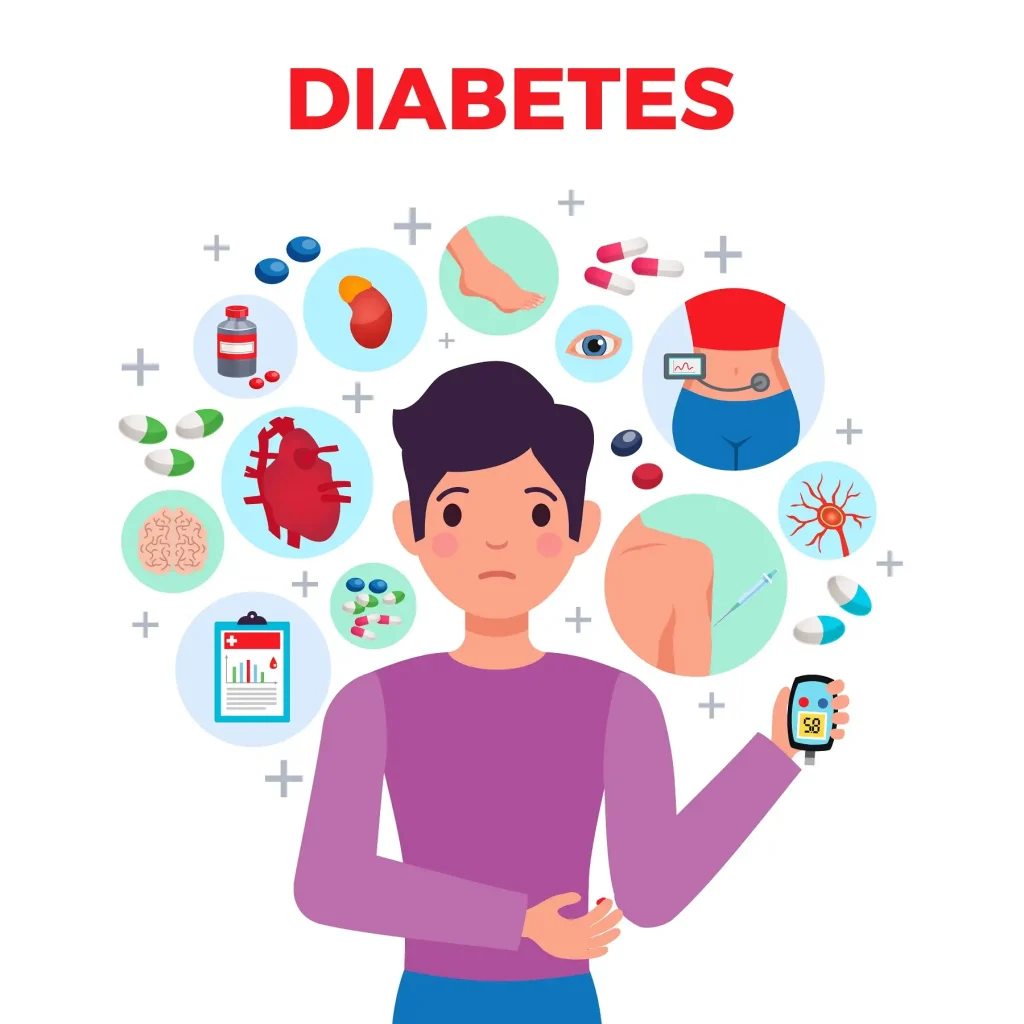Posted: 21/11/2024
Diabetes Awareness Month 2024
Reading Time: 4 minutes
November is Diabetes Awareness Month and one month of the year that’s shines a light on what approximately 4.4 million people in the UK live with every day. This figure is at an all-time high and will in fact be even higher still, as it only includes the people who have received a diagnosis.
There are many people who are yet to be diagnosed but are still living with the day-to-day implications of diabetes, as diabetes can be challenging to diagnose. For some, it might be up to 10 years before being diagnosed with diabetes, which is extremely concerning, given that it is important for diagnosis to take place as early as possible, as it is likely to get worse if left untreated and cause long term health problems.

Diabetes is a condition that causes a person’s blood sugar level to become too high. There are two main types; type 1 diabetes and type 2 diabetes. Type 2 diabetes is the most common type, with around 90% of people having this variant. As well as these types of diabetes, there is also gestational diabetes which affects pregnant women, usually during the second or third trimester.
Type 1 and Type 2 diabetes show similar symptoms, those being;
- Feeling very thirsty
- Feeling very tired
- Losing weight quickly without trying to
- Peeing more than usual
Diabetes can affect anyone but some people are at higher risk of developing diabetes. The risk factors for diabetes are:
- Age – you are more at risk if you are white and over 40 or over 25 if you’re African-Caribbean, Black African, Chinese or South Asian
- Family history – you are 2 to 6 times more likely to get type 2 diabetes if you are have a parent, brother, sister or child with diabetes
- Ethnicity – you are 2 to 4 times more likely to get type 2 diabetes if you are of South Asian, African-Caribbean or Black African descent
- Health and lifestyle – if you have had high blood pressure or obesity, your risk is increased.
- Gender – type 2 diabetes is slightly more common in men than in women
- Smoking and alcohol consumption – this is associated with a higher risk of type 2 diabetes
It is important to recognise that, with the appropriate support and assistance, you can live well with diabetes. A big part of this is treatment, in order to manage and control the condition. There are many forms of treatment available for those with diabetes, which will depend on the type of diabetes; if you have type 1 diabetes, you will need insulin, which helps to manage blood sugar levels. Metformin, which works by reducing the amount of glucose that the liver releases into the body, is the most common treatment for type 2 diabetes and you might also take it for gestational diabetes.

As well as medication, there are lifestyle changes that can help to keep diabetes well controlled, such as eating a healthy, balanced diet and being physically active. Also, regular checks, including blooding tests, are needed to monitor diabetes; you need to work closely with your diabetes healthcare team. Regular checks are important not only for people with a diagnosis of diabetes but for people who are pre-diabetic, where their blood sugar levels are above the normal range but not high enough to be diagnosed with diabetes. Such people are at any increased risk of developing type 2 diabetes but the risk can be reduced through lifestyle changes.
The pandemic had a negative impact of these crucial diabetes checks, with data from six testing centres across the UK, covering around 6% of the population, indicating that 2.5 million diagnostic diabetes tests were missed or delayed during the 6-month lockdown (an average of 400,000 a month) in the UK – including 213,000 missed pre-diabetes and 68,500 missed diabetes diagnosis, with the resulting delay in lifestyle advice and treatment. – https://medicalxpress.com/news/2021-09-uk-million-diagnostic-diabetes-lockdown.html
Although it can be managed, a diagnosis of diabetes is still a life changing diagnosis, as it comes with the risk of complications that can seriously affect your body, such as your eyes, your feet and your heart. Diabetes is not just a physical condition but also one that affects emotionally; it can leave those with a diagnosis feeling isolated from their peers and that they are not able to control their health and wellbeing.
Diabetes is a complicated condition that requires careful management and when this does not happen, such as if there is a negligent delay in diagnosis or there are issues with diabetes monitoring, this can lead to avoidable injury, such as:
- Amputation
- Blindness
- Kidney damage and failure
- Strokes
- Heart attacks
If you or a family member feel that you may have encountered negligent care concerning diabetes, please contact our Clinical Negligence Department on 01482 323697 to discuss how we can help.
FRIENDLY, EFFICIENT LEGAL ADVICE
We’re ready to chat when you are
Drop us an email or give us a call for a no obligation chat to see if we can help.